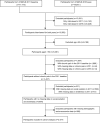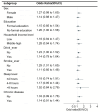Social Connection and Chronic Pain: A Cohort Study to Explore the Association of Social Isolation and Loneliness with Chronic Pain Among Older Adults in China
- PMID: 40860503
- PMCID: PMC12375317
- DOI: 10.2147/JPR.S526555
Social Connection and Chronic Pain: A Cohort Study to Explore the Association of Social Isolation and Loneliness with Chronic Pain Among Older Adults in China
Abstract
Background: As societies worldwide experience rapid aging, social isolation and loneliness are as prevalent and impactful on health outcomes of older adults as other well-recognized risk factors. This study investigates the association of social isolation and loneliness on the prevalence of chronic pain among Chinese older adults.
Methods: Participants from waves of the Chinese Health and Retirement Longitudinal Study (CHARLS) with no chronic pain in baseline 2011, and their conditions of chronic pain in wave 2018, were analyzed. The exposure factors were social isolation and loneliness. Social isolation was assessed by a comprehensive multi-factor measure, while loneliness and the outcome variable, chronic pain, were self-reported. The association of the exposure factors on the prevalence of chronic pain was conducted by logistic regression.
Results: Adults 60 years old and over who did not suffer from chronic pain at baseline in 2011 were enrolled, of whom 1669 participants (53.68%) developed chronic pain, and 1440 did not develop chronic pain, over a span of seven years. The results showed that social isolation (OR: 1.21, 95% CI: 1.01-1.45) and loneliness (OR: 1.61, 95% CI: 1.36-1.92) were associated with an elevated risk of chronic pain over seven years. It showed no statistically significant interaction associations between social isolation and feelings of loneliness.
Conclusion: Older adults with social isolation or loneliness tended to experience chronic pain, emphasizing the importance of incorporating social support and community engagement into chronic pain treatment strategies.
Keywords: chronic pain; cohort study; loneliness; social isolation.
© 2025 Han et al.
Conflict of interest statement
All authors declare no conflicts of interests. This paper has been uploaded to ResearchSquare as a preprint: https://www.researchsquare.com/article/rs-4550828/v1.
Figures





Similar articles
-
Investigation and analysis of mental health status of the older adult in western rural areas.Front Public Health. 2025 Jul 16;13:1612600. doi: 10.3389/fpubh.2025.1612600. eCollection 2025. Front Public Health. 2025. PMID: 40740371 Free PMC article.
-
The association between hearing loss and depression in the China health and retirement longitudinal study.Sci Rep. 2025 Jul 1;15(1):20537. doi: 10.1038/s41598-025-05749-9. Sci Rep. 2025. PMID: 40595946 Free PMC article.
-
Are Levels of Loneliness Associated With Levels of Comfort and Capability in Musculoskeletal Illness?Clin Orthop Relat Res. 2025 Apr 1;483(4):635-642. doi: 10.1097/CORR.0000000000003321. Epub 2024 Nov 19. Clin Orthop Relat Res. 2025. PMID: 39569795
-
Contributions of loneliness to cognitive impairment and dementia in older adults are independent of other risk factors and Alzheimer's pathology: a narrative review.Front Hum Neurosci. 2024 May 30;18:1380002. doi: 10.3389/fnhum.2024.1380002. eCollection 2024. Front Hum Neurosci. 2024. PMID: 38873650 Free PMC article. Review.
-
Exercise interventions and patient beliefs for people with hip, knee or hip and knee osteoarthritis: a mixed methods review.Cochrane Database Syst Rev. 2018 Apr 17;4(4):CD010842. doi: 10.1002/14651858.CD010842.pub2. Cochrane Database Syst Rev. 2018. PMID: 29664187 Free PMC article.
References
LinkOut - more resources
Full Text Sources
Research Materials

